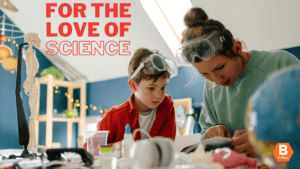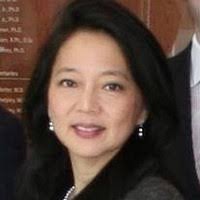
5 Questions with Nikki Hastings, Executive Director, CvilleBioHub
“5 Questions With……” is a weekly BioBuzz series where we reach out to interesting people in the BioHealth Capital Region to share a little about themselves, their work, and maybe something completely unrelated. We’re excited to chat with Nikki Hastings from the southern part of BioHealth Capital Region.
Nikki Hastings is the executive director of CvilleBioHub in Charlottesville, Virginia working to strengthen and grow the regional biotechnology industry ecosystem. Over the past decade, she has contributed to the growth of early-stage companies including HemoShear Therapeutics and Contraline by leading operational and growth needs and supporting the translation of research concepts into commercial viability. Nikki holds a Ph.D. in biomedical engineering from the University of Virginia and a B.S. from North Carolina State University in the same field.
1. What was your first job/role in biotech?
My first industry job was with HemoShear Therapeutics, a start-up out of the University of Virginia commercializing the technology I worked with for my dissertation. The goal was to use human-based in vitro models for preclinical prediction of therapeutics being developed by big pharma. At the time, it was a natural progression for me in continuing to work with the technology, and I found myself very excited by entrepreneurship and learning rapidly along the way to understand organizational and operations development. I was fortunate to be exposed to the business aspects of commercialization and I grew into the role as the VP of Operations. Today, the company is focused on drug discovery for rare metabolic disorders with significant unmet therapeutic need.
2. What can you tell us about your current role and company?
Currently, I am the executive director of CvilleBioHub, an industry-led private non-profit supporting growth of the biotech industry in the Charlottesville-area. Since beginning my career in industry, I have been passionate about connecting people and resources within this community, which began with grad student friends reaching out to find about local biotech industry job opportunities. Several other local industry leaders and I co-founded CvilleBioHub because we saw an opportunity to bring more awareness to the industry cluster for those interested in being involved and connected. We have recently launched a new website that includes company profiles, resources and now expands workforce connection for job seekers to apply for opportunities on our jobs board.
3. What can you tell us about the Charlottesville Biotech community beyond the hub?
Charlottesville is known for its strength in innovation, and most of the 65+ companies have a connection to UVA-developed technology. Nearly half of the companies here are working on medical devices and instrumentation and we are seeing an increase in activity around digital health, as is happening more broadly, and in ag tech. The community is very engaging, collaborative and supportive; evident even more so during these pandemic times. The biotech scene goes deep and we continue to hear of new ideas that people are commercializing. Overall, with an unparalleled quality of life, Charlottesville is a draw for great scientists and people seeking access to a strong education system, high culture and an intellectually rich fabric within a small geographic footprint. It brings many advantages for business operations including lower infrastructure costs and high retention of talent.
4. How do you measure or evaluate success for the companies you work with?
In 2019, we conducted an industry analysis to understand the makeup of our community and to examine status of patents and grants awarded, capital raised, size and footprint. It’s the stake in the ground from which we can measure the growth of the industry, where our long-term goals are set to double the size of by 2030.
Our role is not to evaluate the success of the companies. We are here to support them in taking their next steps from A to B and closing the gaps in commercialization that often lead early-stage companies to fail. We’ve begun an Entrepreneur-in-Residence program this year with the addition of Paul Sartori, MBA, PhD, who is connecting with companies to provide guidance for where they are in the process. Startups in biotech are hard and leaning on our organization can provide an experienced set of eyes on the challenges they are facing.
5. What is the more interesting thing you’ve read or seen this week, and what makes it so interesting?
What I saw this week that was interesting was a comment by Maria Van Kerkhove, the WHO’s technical lead on the Covid-19 pandemic that the coronavirus asymptomatic transmission was “very rare” which then received emphatic pushback from other public health authorities. The WHO says that the rate of asymptomatic transmission is still unknown while other experts are suggesting a rate as high as 50%. It highlights the lightning pace of communication and how misinformation or miscommunication can create significant risks in our current global health care crisis and it’s a call for all of us to be patient with the process, as we are still just beginning to understand more about the virus.
Thanks to Nikki Hastings for participating in the ‘5 Questions with BioBuzz’ series and stay tuned for more interviews with others from across the BioHealth Capital Region.




